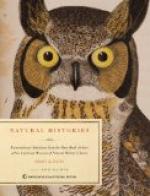Now the hawk had bribed the cuckoo, who was his cousin, to do this, and the cuckoo was not at all unwilling, for he had an interest himself in keeping the birds divided, so he said that although he had made up his mind to go on his summer tour, leaving his children to be taken care of by the wagtail, he would stop a day or two longer to manage this little business. No sooner had the cuckoo said this, than there was a most terrible uproar, and all the birds cried out at once. The blackbird was so disgusted that he flew straight off, chattering all across the field and up the hedge. The bullfinch tossed his head, and asked the goldfinch to come up in the bush and see which was stronger. The greenfinch and the chaffinch shrieked with derision; the wood-pigeon turned his back and said “Pooh!” and went off with a clatter. The sparrow flew to tell his mates on the house, and you could hear the chatter they made about it right down at the brook. But the wren screamed loudest of all, and said that the goldfinch was a painted impostor, and had not got half so much gold as the yellow-hammer. So they were all scattered in a minute, and Bevis stood up and hurried homeward.
[Illustration]
THE LOON
(FROM WALDEN.)
BY HENRY D. THOREAU.
[Illustration]
It is remarkable how many creatures live wild and free, though secret, in the woods, and still sustain themselves in the neighborhood of towns, suspected by hunters only. How retired the otter manages to live here! He grows to be four feet long, as big as a small boy, perhaps without any human being getting a glimpse of him. I formerly saw the raccoon in the woods behind where my house is built, and probably still heard their whinnering at night. Commonly I rested an hour or two in the shade at noon, after planting, and ate my lunch, and read a little by a spring which was the source of a swamp and of a brook, oozing from under Brister’s Hill, half a mile from my field. The approach to this was through a succession of descending grassy hollows, full of young pitch-pines, into a larger wood about the swamp.
There, in a very secluded and shaded spot, under a spreading white-pine, there was yet a clean, firm sward to sit on. I had dug out the spring and made a well of clear gray water, where I could dip up a pailful without roiling it, and thither I went for this purpose almost every day in midsummer, when the pond was warmest. Thither, too, the wood-cock led her brood, to probe the mud for worms, flying but a foot above them down the bank, while they ran in a troop beneath; but at last, spying me, she would leave her young and circle round and round me, nearer and nearer till within four or five feet, pretending broken wings and legs, to attract my attention, and get off her young, who would already have taken up their march, with faint wiry peep, single file through the swamp, as she directed. Or I heard the peep of the young when I could not see the parent bird.




